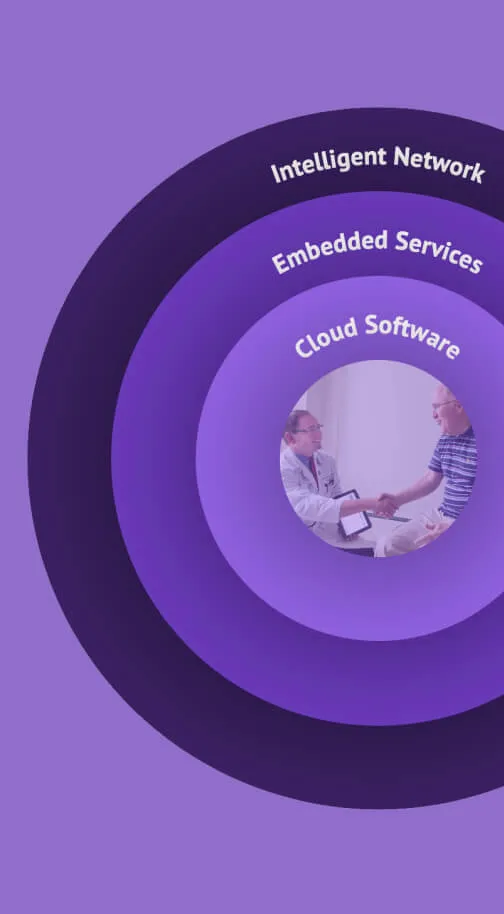Ridgeview Internal Medicine Group, LLP
Intuitive EHR drives efficiency, improves patient and provider satisfaction
Adopting athenahealth’s cloud-based solution reduces burnout
Significant physician burnout
Clinical inefficiency caused by cumbersome EHR impacted practice growth
Laborious and time-intensive software installation update forced physicians to stay at work after hours for installation
Lengthy charting procedures were a distraction during patient visit
athenaOne®
Results
Improved patient-provider relationships, driven by clinical efficiency with an intuitive EHR
Significant improvement in physician professional satisfaction with effortless updates let them focus on patients, not IT
Automated value-based care and MIPS reporting saved hours of time for physicians
Dr. Joseph DiPoala, Jr. co-found Ridgeview Internal Medicine in 1992, which became an independent practice in 2000. Long a believer in the power of technology to connect practitioners, payers and patients, Ridgeview became one of the first in its region to fully adopt electronic health records in 2001. They thought adopting eMDs in 2009 would help connect the dots. But continued roadblocks when it came to frequent updates, more complicated reporting requirements, and growing to scale when faced with lengthy charting processes meant Ridgeview was spending more time on data entry and less time on patients and profitability. Adopting athenahealth’s cloud-based solution, athenaOne, in 2015, which also includes 24/7 customer service, was a game-changer in reducing physician burnout and enabled remaining independent.
Partnership is the right fit for independent practice growth
As an independent practitioner, when Dr. DiPoala first signed onto eMDs, he was ready to assume more IT responsibilities versus doctors in larger healthcare systems, but this quickly became overwhelming when it came to server maintenance, the long process of creating new employee accounts, and frequent IT updates to fix glitches. “I had to use my own time and schedule updates after hours. There were lots of bumps in the road, things that had to be patched and redone. Many practices probably don’t have a partner who can do this for free.”
After three years of frustration, DiPoala and his partners saw no improvement in their EHR — it was time to migrate to a different EHR and practice management vendor. Dr. DiPoala told his colleagues “this is killing us,” he said. “The workflow usability was just crushing us as we tried to see our patients and do the right care and documentation. We had to go shopping for a different solution.”
That solution was athenaOne. As part of a regional Health Information Exchange and someone passionate about tech startups, Dr. DiPoala is invested in sharing not only patient records but industry insights. Being able to provide feedback and see continued enhancements to athena’s EHR features, for instance, makes him more of a partner than just a user, he says. That relationship includes the support of a dedicated customer service manager. “Customer support with athena has been good. It’s certainly easy to access, very, very easy in terms of the phone calls,” he said.
Making connections within the athena Marketplace — a third-party app store — has also proved invaluable, explained DiPoala. One of the biggest challenges for practices converting to a new EHR is data conversion. Ridgeview was able to beta-test a Marketplace conversion option, and DiPoala provided in-depth feedback on the program’s design and testing process. “The marketplace opportunities are no small thing,” he said. “I’m confident that athena is head and shoulders above the competitors. We’ve really benefited from athena’s embrace of third parties and being a leader with regard to opening the architecture to those opportunities.”
The right solution enables independence, profitability
The struggles with Ridgeview’s former EHR also led to some pivotal discussions between the practice’s partners when it came to remaining independent. “We knew it was going to be painful to choose another EHR — with the migration and all of that. That was one of the times when we had to start considering, ‘Should we go back to employment by the hospital?’”
From its founding in 1992 to 2000, Ridgeview was part of Rochester General Hospital. While independence offered the potential for more administrative freedom, profitability, and more hands-on patient care, only the proper technology would enable success. Interoperability is hugely important, and by using athenaClinical’s patient record-sharing functionality, DiPoala and his colleagues are able to save time versus using eMDs, which required calling providers or logging onto Rochester General’s separate EHR. They formerly had to search for documents, print them out, and scan each record in. Adding new patient charts is also easier and reduces administrative burden, which eliminates manual input of key PAMI data — problems, allergies, medications, and immunizations. DiPoala estimates saving nine minutes per new-patient chart, and says this bandwidth has increased flexibility and profitability. “When you’re dealing with an EHR that doesn’t support your work well, you’re a lot less willing to take on new patients, and you have trouble taking care of the patients you do have,” he said. “When you’re going to be bound up in a room just doing battle with your EHR, you don’t have the flexibility double-book or extend the hours a little later in the evening because you’ll be burning the midnight oil on documentation.”
Functionality including macros, workflow, encounter plans and accurate order predictions have not only saved Ridgeview staff incremental amounts of time in exam rooms, but athena’s advanced reporting capabilities have contributed to enhanced patient health measures and prevented physician burnout, he says. Guidelines determining gaps in vaccinations, for instance, are flagged in patient charts and have led to an increase in the number of followups scheduled for such procedures.
When it comes to the Merit-based Incentive Payment System, DiPoala says pinpointing care gaps benefits population health and the continued transition to value-based care and MIPS (which offer monetary rewards for care coordination and health outcomes). “Anything that helps our bottom line, like with the commercial payers in particular, that helps us with the valuebased care opportunities, that decreases the pressure on us to be on that hamster wheel — where you’ve got to see more and more patients, just to stay viable — that’s a good thing,” said Dr. DiPoala. Since adopting athena, Ridgeview has scored higher than regional providers in an incentivized value-based care program, and is a top performer in terms of quality measures in a local accountable care organization with two of its biggest payers.
'Supporting volume and quality of care'
Hours saved with faster automated reporting — and on not having to troubleshoot technical problems with frequent updates that aren’t cloud-based, as was the case with eMDs — have helped bring the joy back to medicine for DiPoala and his partners. Chart preparation through athena means physicians can focus on the patient in exam rooms and have less work afterwards.
“The less I’m distracted by data entry and all the things that I have to do in the computer, the more time I have to make eye contact and engaged with the patient,” says DiPoala. “I feel good about the way athena supports the volume, as well as importantly, the quality of care.”
That quality is partially informed by patients themselves, who have been very engaged in their own health through their patient portals. DiPoala credits the increased adoption rate, in part, to how easy it is for patients to use athena technology for greater visibility and input into their care outcomes. He says his practice has saved hours on medication reconciliation by getting this data through the portal, versus traditional, more hands-on follow-ups.
The less I’m distracted by data entry and all the things that I have to do in the computer, the more time I have to make eye contact and engage with the patient.









